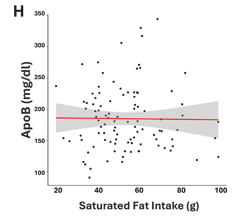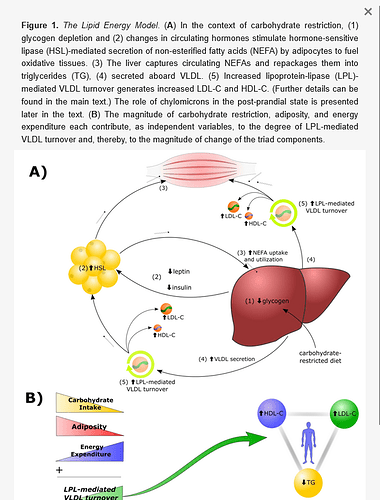Positive LMHR paper
i saw that. Neither ApoB nor LDL predicted higher plaque progression, whereas CAC score did. This implies that whatever is causing plaque progression is not solely high ApoB or LDL. Which has made sense to me for a long time. I’m assuming this is also true for high Lp(a), but I haven’t looked to see if that’s there.
Yeah, just been watching that … Not sure if I qualify as a LMHR. Plus I’ve never had a scan
I believe the theory is that if you lose weight, particularly to the point of becoming “thin”, you’ll become a LMHR. I have been slowly losing weight, and my LDL has gone up. I think it’s due to this phenomenon.
Now, I’m still far from being “thin”, but it makes sense given their data (from a general population of keto folks) that LDL goes up the thinner one gets.
Though I do wonder how much exercise helps the LDL increase. For instance, assume two people who are the exact same (same everything, eg, lean, the triad except for LDL), but one does marathons and the other one jogs a few miles a few times per week. Would there be an LDL difference between these two? I assume there would be (higher LDL for the marathon runner), but I don’t know and don’t know to what extent the difference would be.
I’m just right, though not too thin either. But I’m 55 lbs (25kg) thinner than 2 years ago and yes, my LDL is high, my trig is low so yes, I could well be a proud LMHR 
Dave Feldman is on Metabolic Mind. I listened on a podcast, but they review some of the figures, so it’s probably better to watch it:
This is significant research. Let’s see what the effect of it is. I expect it to be ferociously attacked by pharmaceutical interests and those in their pay. But it should be a very exciting ride.
I’m not sure one can turn oneself into a lean-mass hyper-responder, merely expose an existing tendency. But I’m a bit out of touch with the current thinking. Dave used to talk as though he thought it was a genetic variation. But we’ve been on the wrong diet for so long, who really knows?
I think it’s basically if you get lean, you’ll be a LMHR or at least closer to that. This is the way it looks:
From here:
https://www.mdpi.com/2218-1989/12/5/460
As you eat fewer carbs and have less adiposity, you’re more likely to become a LMHR. It looks like exercise also plays a role (more exercise = more likely to be LMHR).
I’m least sure of the exercise part, because I’ve seen quite a few people (mainly women?) who fit the LMHR criteria but don’t exercise all that much, relatively speaking. Dr. Jen Unwin’s LDL is insanely high, but I don’t think she exercises all that much, for instance.
I think if you become thin on keto, you’ll get closer to the LMHR triad. I think that’s Dave’s current thoughts. And it’s supported by their other study of people who go on a keto diet: the highest LDL rise is in the thinnest and fittest people. (Again, I can’t quantify the effect of exercise, though I think it plays a role.)
Huh. I’ll have to read up. But I’m glad we are not stuck in a hypothesis and can adapt to new evidence.
Yeah, the idea that LDL (or ApoB or Lp(a)) just decides to attack the artery wall for some reason and cause atherosclerosis just never made sense to me. And there are just so many holes in it. For instance, people with FH (familial hypcholesterolemia) have had high to very high LDL their entire lives, yet some of them have zero scores on a CAC, but others (similar ages and LDL levels) don’t. How is that possible if LDL is causing the atherosclerosis? If two people who are 50 (or 60 or whatever) and have an LDL of 200 or 250 or whatever, shouldn’t they have exactly the same CAC scores?
I think younger doctors might reconsider things in light of this, but I’m not sure older ones will. Saw my now-retired cardiologist at my store, and he was talking about lean meat being on sale, because he didn’t want fatty meat. Hard to change some folks.
Dave talked about this figure, which is ApoB versus (reported) saturated fat intake:

Assuming the reported saturated fat intake is anywhere close to being correct, the ApoB has no relationship with saturated fat intake.
A new scientific truth does not triumph by convincing its opponents and making them see the light, but rather because its opponents eventually die and a new generation grows up that is familiar with it. . . .
An important scientific innovation rarely makes its way by gradually winning over and converting its opponents: it rarely happens that Saul becomes Paul. What does happen is that its opponents gradually die out, and that the growing generation is familiarized with the ideas from the beginning: another instance of the fact that the future lies with the youth.
— Max Planck, Scientific autobiography, 1950, p. 33, 97
One thing that’s really interesting from here is that if you had calcification at the start, you tend to have more calcification at the end; whereas if you didn’t at the beginning, you didn’t at the end. This is the title’s “calcification begets calcification”.
Considering this group of folks is pretty fungible (a term I’ve only seen used in law – meaning replaceable), and metabolically healthy, what’s going on with those who had and continue to have calcification? That’s where we should be placing additional research as to the “cause” of atherosclerosis, in my opinion.
Yes, I heard this from the horses mouth … but start of what? Put like that it suggests you can’t get rid of it!
I have seen evidence of reversals.
The attacks have already started:
If this is the same “Dr. Katz” I know of, he’s a vegan. Not keto friendly at all. But I could be wrong.
We knew it was coming. Only way to make plants good is to make meat bad… Dr Katz can sleep well tonight knowing we are all sick. Strange … cus I feel great!
I admit the graph isn’t encouraging, and I don’t want to stick my head in the sand, but unfortunately “keto, carnivore or very low carb” tells us incredibly little about what people Did eat. Loads of meat, or loads of fat? Loads of processed junk with Keto Friendly! on the label? What I call magic food, where adding fiber or chilling foods somehow negates their innate carb count? Claiming there’s something intrinsically unhealthy about Any diet that avoids carbs just doesn’t seem reasonable.
Good to know the truth … if it is the truth? things change. Personally I don’t need a study to tell me Blood pressure is down, Diabetes has gone, Colitis has gone, psoriasis has gone, obesity has gone and I feel better.
Would a vegan diet have done that? Maybe some of it … but the ulcerative colitis would be worse. Lee Copus (Kent Carnivore) lost his colon thanks to fiber.

